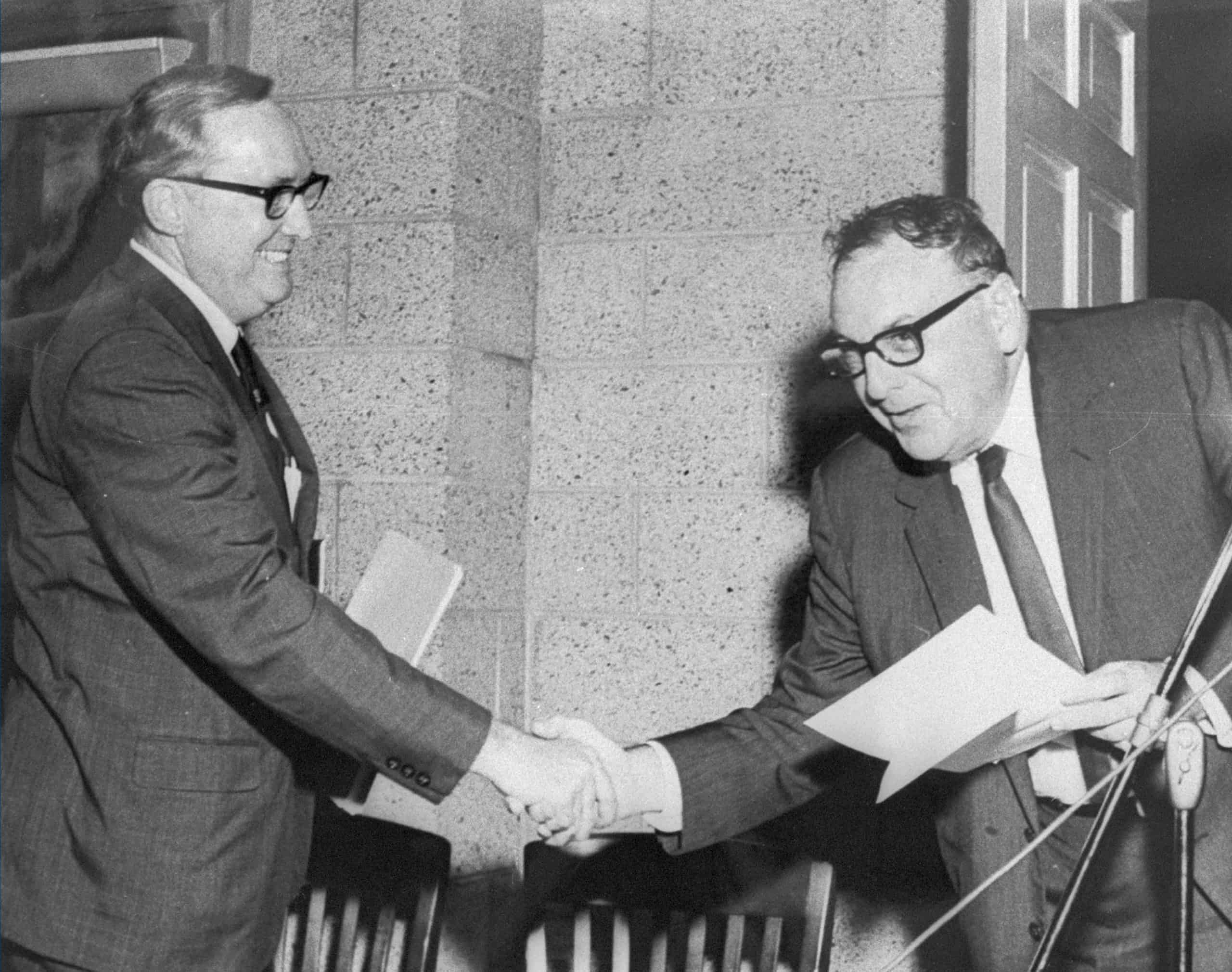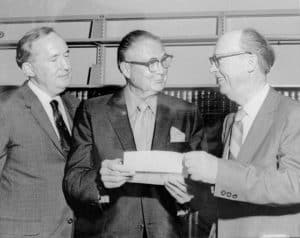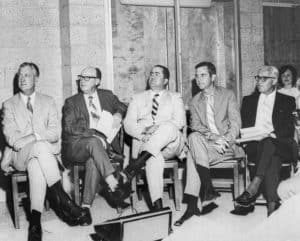June 30, 2020

Founders Day at 50: Founding of FMU remains a hot topic
Fifty years ago, higher education in the Pee Dee changed forever.
That’s when the oft-neglected region gained a university it could call its own. That’s when Francis Marion University was created.
The school, then known as Francis Marion College, had been in the works for more than a decade. Community leaders in Florence and beyond worked long and hard to bring a two-year branch of the University of South Carolina to town, and then to turn that entity into a full-fledged four-year college.
It finally happened on July 1, 1970.

Dr. Howard J. Stokes (center) presents the deed which is accepted by James A. Rogers, Chairman of the Board of Trustees of State Colleges. Dr. Walter “Doug” Smith, the university’s first president, observes the transfer.
On that day, the original 100 acres of land donated for the school by the Wallace and Gregg families was transferred to the State of South Carolina, FMC began operating under its newly hired administration, led by President Doug Smith.
In this special 50th year, FMU has remembered the founding of the college half a century ago with numerous events in the year leading up to July 1, 2020. More commemoration events are planned for this fall.
Dr. Fred Carter, FMU’s current president, says the university is proud of its distinctive and eventful history, but the focus remains clearly on the future.
“The creation of FMU is a great story of collaboration and cooperation within our region and across our state,” says Carter. “We’re so very proud of our founders and pleased with the accomplishments of the past few decades as their successors have built upon that legacy. And yet, there is much more yet to come in the next few decades. With support from our many partners in the community, this university has just begun to realize its potential academically, culturally, economically, and developmentally.”
Interestingly, as FMU enters its 50th year, it is in the midst of a major growth spurt. The university set an enrollment record in the 2019-20 academic year, and a series of new academic facilities are set to open this year and next. They include the Honors Center on the main campus and the Hugh and Jean Leatherman Medical Complex downtown, both of which will open in the 2020-21 academic years; and the new freshwater ecology laboratory, which is scheduled to open on FMU’s new Mars Bluff campus sometime in 2021-22. And, as the geographic diversity of that immediate growth suggests, FMU is also progressing as a multi-campus site. It has three academic campuses in Florence County, and a presence at Hobcaw Barony in Georgetown County, where it jointly operates the Belle Baruch Institute for South Carolina Studies with Coastal Carolina University and the Belle Baruch Foundation.
All that is part of the broad long-term vision for FMU, held by its founders 50 years ago. They may not have known precisely how the university would develop, or expected it to happen as fast as it has, but they knew if they could get it started good things would happen.
For that reason and many others, the arrival of a brand new college in town was a hot topic in Florence and the Pee Dee back in 1970. It’s no real surprise then that the official transfer took place a day that was notably hot, even by local standards.
The transfer ceremony was set for the middle of the afternoon on July 1, 1970 because many of the board members and state leaders involved had to attend a similar transfer ceremony in Charleston that morning. It was supposed to be held on the lawn in front of Stokes Hall, then the only building on campus. But as temperatures climbed above 100 — 10 degrees hotter than the day before — organizers decided it was too much for a day of coats, ties, and lengthy oratory. The proceedings were moved into the “lobby” of Stokes, which was really little more than a wide hallway. The air-conditioning system there was decidedly overmatched by the overheated throng, but it was better than the heat outside. They made do, a hallmark of FMC then and for many years to come.

(Left to Right) Some distinguished participants of Founders Day included Dr. James A. Morris, Commisioner of Higher Education; James Rogers, Chairman of the Board of Trustees of State Colleges; Rep. Peter D. Hyman, South Carolina Representative; Rev. M.L. Meadors, Jr, Pastor of First United Methodist Church in Marion; and David H. McLeod , Mayor of the City of Florence.
The hundreds gathered waved programs for fans and listened to remarks from an assortment of distinguished speakers. Dr. William Patterson, USC’s provost, made the formal transfer of administration to Dr. Smith. Dr. J. Howard Stokes, chairman of the Pee Dee Education, which had orchestrated the creation of FMC and its precursors, presented James A. Rogers, chair of the State College Board, which oversaw operations at FMC and two other newly created public regional colleges, with the property deed.
Rogers, who was also the editor of the Florence Morning News, noted the long lineage of the land — it went all the way back to a colonial-era charter — and said that made it even more important that the fledgling institution “build well in all the qualities which make for an environment where eager and creative minds may have rewarding experiences in spiritual and intellectual growth.”
Smith, the founding president, agreed. He said FMC would immediately begin “building a program to make Francis Marion College truly ‘the college for the future.’”
David McLeod, Florence’s mayor, captured the ebullient community of the day.
“Florence has seen a lot of historic days,” McLeod says, “but this tops them all.”
FMU, then and now
1970 2020
Acreage 100 846
Buildings 2 37
Campuses 1 3
Students 906 4,241
Majors 10 58
Graduates 0 25,133
Highest Degree Baccalaureate Doctorate